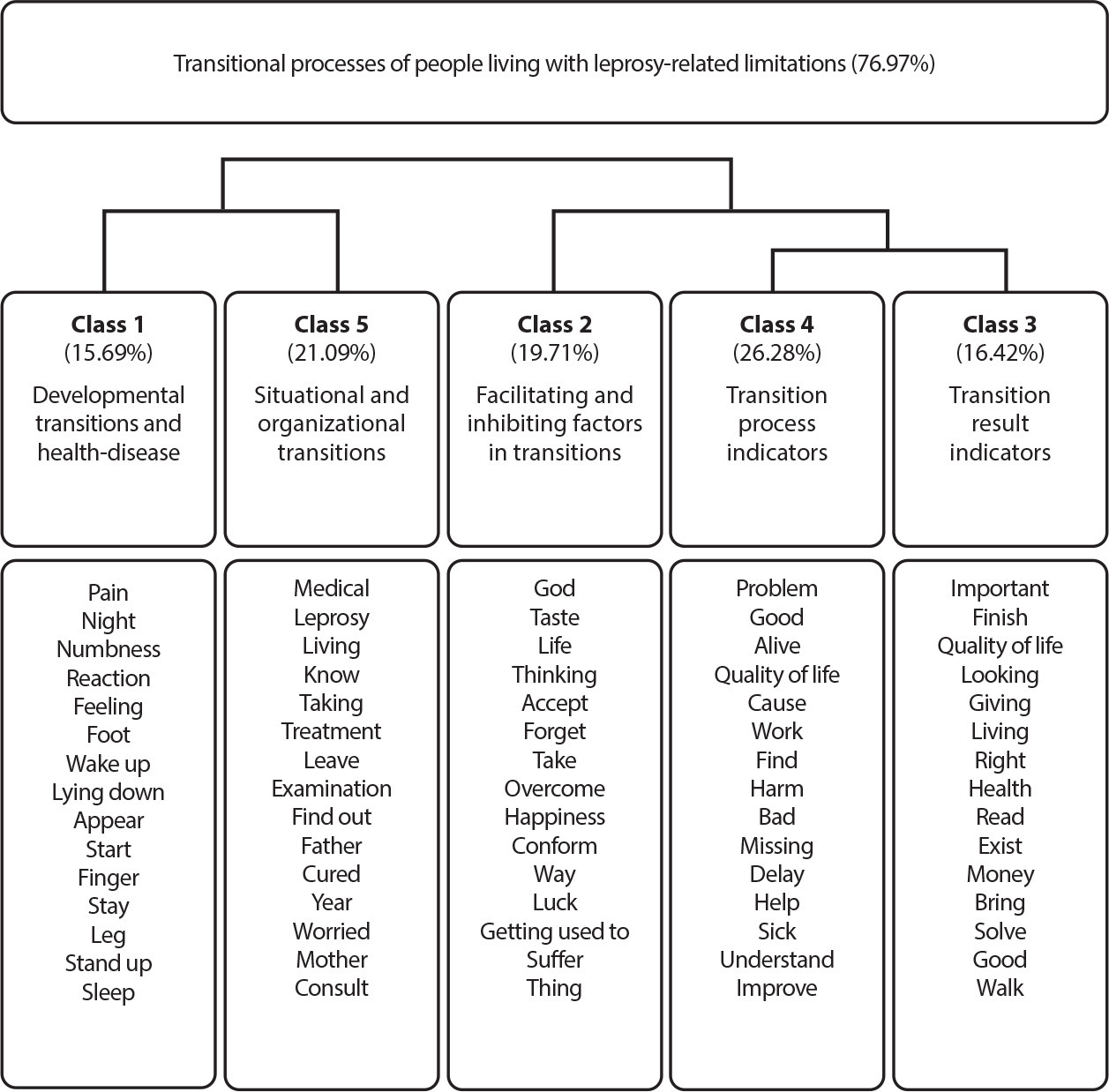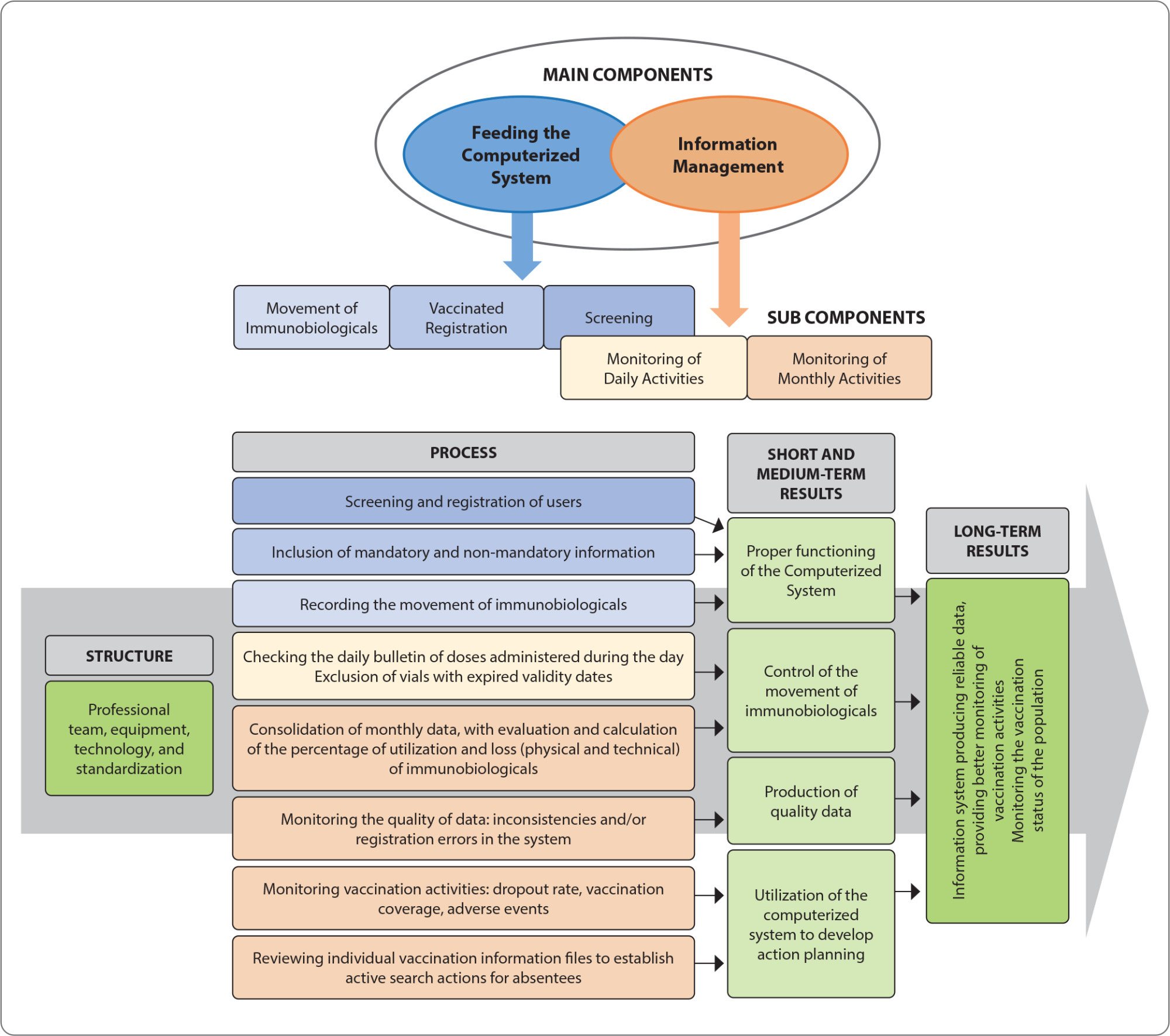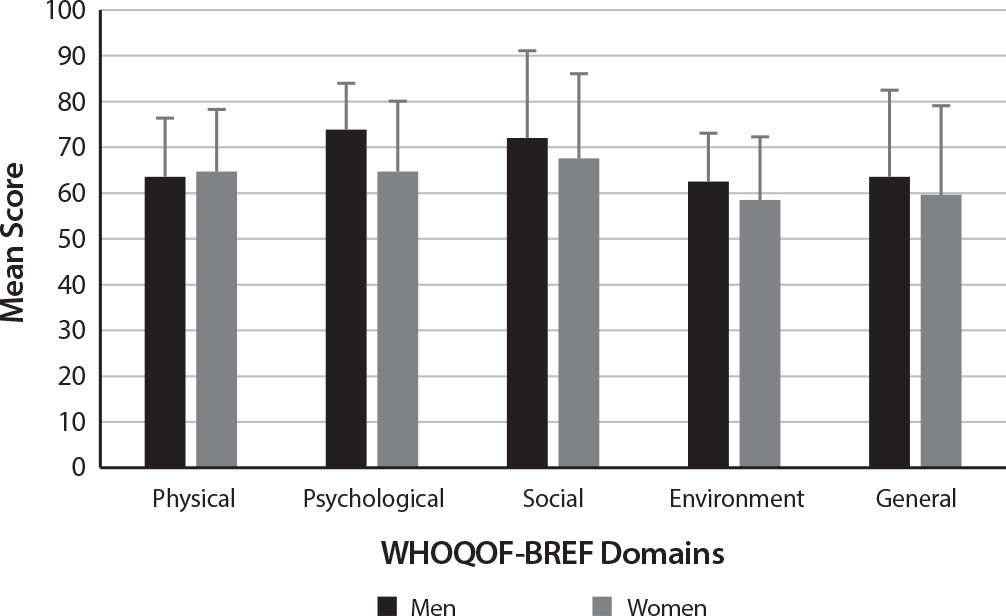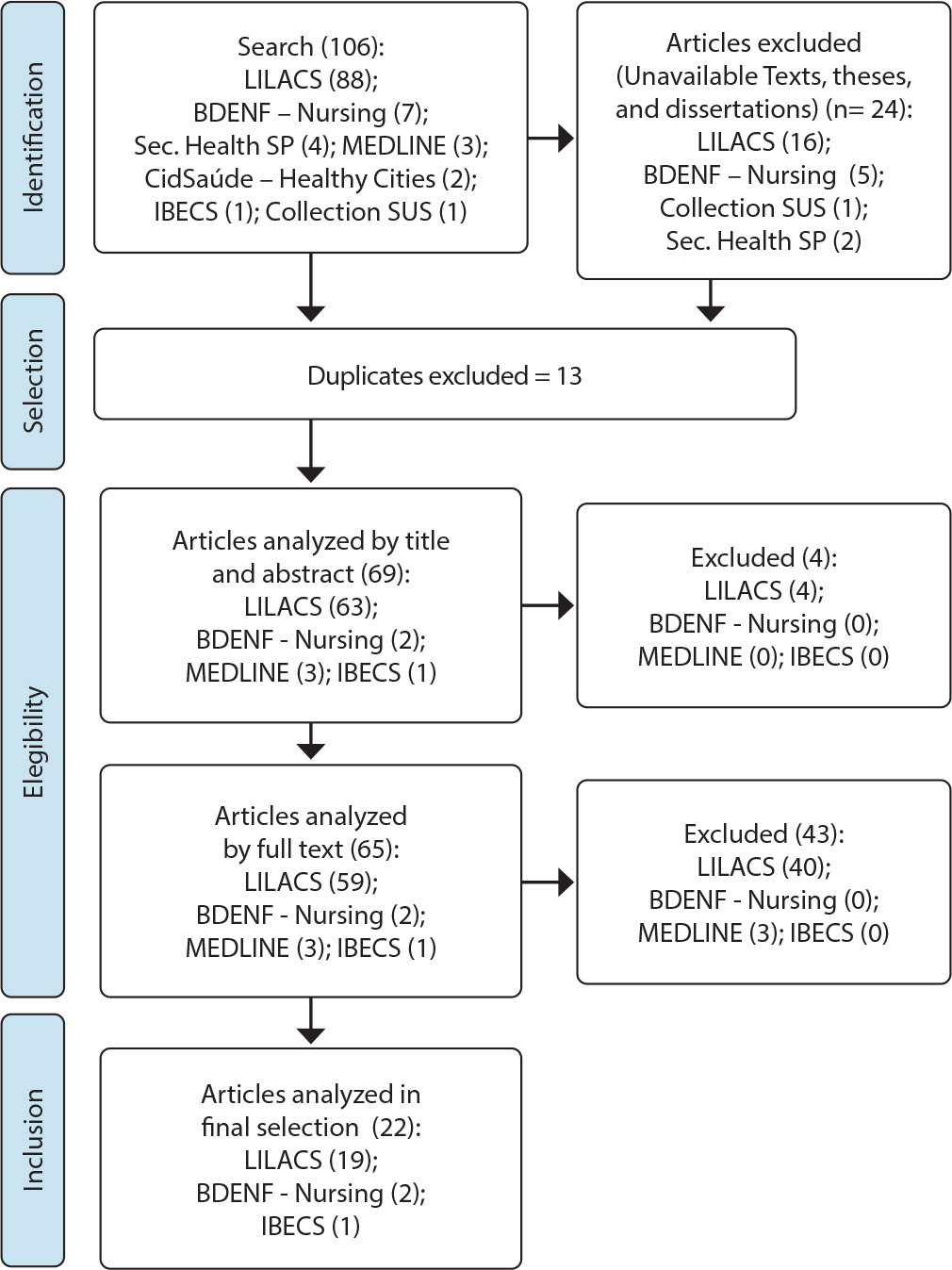-
RESEARCH01-01-2015
Nursing actions in primary care and the control of diseases preventable through vaccines
Revista Brasileira de Enfermagem. 2015;68(5):803-809
Abstract
RESEARCHNursing actions in primary care and the control of diseases preventable through vaccines
Revista Brasileira de Enfermagem. 2015;68(5):803-809
DOI 10.1590/0034-7167.2015680506i
Views0See moreABSTRACT
Objective:
to discuss the actions performed by nurses in the control and eradication of diseases preventable with vaccines in healthcare setting, according to the National Primary Health Care Policy.
Method:
qualitative research supported by the social phenomenology of Schutz. It had as its setting a Family Health Clinic, located in the city of Rio de Janeiro (Brazil), with ten nurses. The data collection occurred through interviews.
Results:
nurses’ actions aimed at the control and eradication of preventable diseases mainly involve updating a vaccination card, administering the vaccine, and guiding the user of the Health Unit, with the purpose of preventing diseases. The National Primary Care Policy and all manuals from the Ministry of Health recognize the importance of focusing on the service user.
Conclusion:
the user’s lifestyle must be considered, and his access to services aiming at the expansion of the control of diseases preventable with vaccines should be promoted.

-
RESEARCH01-01-2015
Children with neuropsychomotor development delay: music therapy promoting quality of life
Revista Brasileira de Enfermagem. 2015;68(5):797-802
Abstract
RESEARCHChildren with neuropsychomotor development delay: music therapy promoting quality of life
Revista Brasileira de Enfermagem. 2015;68(5):797-802
DOI 10.1590/0034-7167.2015680505i
Views0See moreABSTRACT
Objective:
to identify the influence of music therapy on the behavior and quality of life of children with neuropsychomotor development delay (NPMDD).
Method:
experimental research, with applications of music therapy (in a group of children) held in the specialized association in Cruz das Almas – Bahia, composed of 17 children with NPMDD aged 5 to 12 years. The behavior of children involving emotional, physical, social and school aspects was observed.
Results:
there was an evolution in all aspects, being this improvement significant to Emotional Capacity and School Capacity domains, showing the beneficial effects of music therapy.
Conclusion:
music therapy becomes a treatment option for children with NPMDD, improving their quality of life.

-
RESEARCH01-01-2015
Spirituality, religion and personal beliefs of adolescents with cancer
Revista Brasileira de Enfermagem. 2015;68(5):791-796
Abstract
RESEARCHSpirituality, religion and personal beliefs of adolescents with cancer
Revista Brasileira de Enfermagem. 2015;68(5):791-796
DOI 10.1590/0034-7167.2015680504i
Views0See moreABSTRACT
Objective:
to examine adolescents’ perception about spirituality, religion and personal beliefs in their lives due to cancer and a possible strategy for coping with the disease.
Method:
qualitative research, both descriptive and exploratory. The data were collected by means of a personal semi-structured interview, and the categories were analyzed by content analyzes.
Results:
nine adolescents who were undergoing cancer treatment at one of the two institutions located Uberaba, Brazil, participated in the study. Based on the analysis and interpretation of results, it was possible to systematize them according to four categories: spiritual history of the individual; faith and belief; importance of spirituality in their lives, and the community acting as a spiritual supporter. Most adolescents referred to spirituality as being an important tool for dealing with the disease, especially concerning religious rituals and community support.
Conclusion:
spirituality creates hope for adolescents, which helps them to cope with cancer-related diffi culties and contribute to the search for the meaning of life.
-
RESEARCH01-01-2015
Coping strategies of nursing students for dealing with university stress
Revista Brasileira de Enfermagem. 2015;68(5):783-790
Abstract
RESEARCHCoping strategies of nursing students for dealing with university stress
Revista Brasileira de Enfermagem. 2015;68(5):783-790
DOI 10.1590/0034-7167.2015680503i
Views0See moreABSTRACT
Objective:
to identify the coping strategies used by nursing students in a university in southern Brazil, establishing the relationship between the sociodemographic and academic variables examined.
Method:
an exploratory, descriptive, quantitative study, carried out with 146 nursing students, through application of the Coping Strategies Inventory. For the data analysis, descriptive statistics, analysis of variance and regression analysis were used.
Results:
it was found that the coping strategy most used by nursing students is escape. A connection was also detected between the academic dissatisfaction variable and the use of negative coping strategies.
Conclusion:
it was noted that students satisfi ed with the course used positive coping strategies targeting the problem, whereas dissatisfi ed students used negative strategies focusing on the emotion.

-
RESEARCH01-01-2015
Unemployment and psychological distress in nurses
Revista Brasileira de Enfermagem. 2015;68(5):775-782
Abstract
RESEARCHUnemployment and psychological distress in nurses
Revista Brasileira de Enfermagem. 2015;68(5):775-782
DOI 10.1590/0034-7167.2015680502i
Views0See moreABSTRACT
Objective:
to assess psychological distress in nurses searching for their first job, especially symptoms of depression, and identify the factors that caused mental suffering, and how these nurses cope with the situation.
Method:
this was a qualitative study carried out with unemployed nurses who had graduated less than two years before the time of the study, and were residents of the town of Assis in the Brazilian state of São Paulo. Data were gathered by means of semi-structured interviews, content analysis, and application of the Beck Depression Inventory psychometric scale.
Results:
of the 14 nurses that participated, three had scores on the psychometric scale indicative of depression. Participants reported psychological distress related to unemployment, poor university education, and surplus labor due to the large number of graduates and lack of jobs, as well as a culture of employment centered on professionals’ social networks. The unemployed nurses did not have effective ways of coping.
Conclusion:
unemployment promoted psychological distress among the new nurses, especially symptoms of depression, without effective means of coping.
-
EDITORIAL01-01-2015
Newborn blood spot screening: to expand or not to expand?
Revista Brasileira de Enfermagem. 2015;68(5):771-772
Abstract
EDITORIALNewborn blood spot screening: to expand or not to expand?
Revista Brasileira de Enfermagem. 2015;68(5):771-772
DOI 10.1590/0034-7167.2015680501i
Views0“The principal constraint on what we can detect in newborn screening is fast becoming what we choose to detect: rather than what is limited for us by technical feasibility or cost”().Technological advances are providing the medical world an opportunity to extend the number of conditions newborn babies are screened for. Tandem mass spectrometry (TMS, also […]See more -
EDITORIAL01-01-2015
Teste de triagem neonatal: expandir ou não expandir?
Revista Brasileira de Enfermagem. 2015;68(5):771-772
Abstract
EDITORIALTeste de triagem neonatal: expandir ou não expandir?
Revista Brasileira de Enfermagem. 2015;68(5):771-772
DOI 10.1590/0034-7167.2015680501i
Views0“A principal restrição sobre o que podemos detectar no teste de triagem neonatal está rapidamente se tornando o que escolhemos detectar em vez daquilo que nos é limitado por razão de viabilidade técnica ou custo”().Os avanços tecnológicos estão conferindo ao mundo médico uma oportunidade de aumentar o número de patologias para as quais os recém-nascidos […]See more -
REVIEW01-01-2015
International Classification for Nursing Practice – ICNP®: application to the Brazilian reality
Revista Brasileira de Enfermagem. 2015;68(4):730-731
Abstract
REVIEWInternational Classification for Nursing Practice – ICNP®: application to the Brazilian reality
Revista Brasileira de Enfermagem. 2015;68(4):730-731
DOI 10.1590/0034-7167.2015680422i
Views0The author and organizer, Telma Ribeiro Garcia, added her theoretical and practical knowledge to those of a dozen other authors for the creation of the book “International Classification for Nursing Practice – ICNP®: application to the Brazilian reality”. She is a retired professor of the Department of Public Health Nursing and Psychiatry at the Federal […]See more
-
ORIGINAL ARTICLE10-06-2023
Nursing students’ professional values for reinforcing the professional identity
Revista Brasileira de Enfermagem. 2023;76:e20220338
Abstract
ORIGINAL ARTICLENursing students’ professional values for reinforcing the professional identity
Revista Brasileira de Enfermagem. 2023;76:e20220338
DOI 10.1590/0034-7167-2022-0338
Views0ABSTRACT
Objectives:
to understand the nursing students’ professional values in different Brazilian universities and verify a correlation between the “Professional Value” and the sociodemographic variables.
Methods:
quantitative, cross-sectional, and descriptive study conducted through an electronic questionnaire with a Professional Values Scale (NPVS-3). Participants were Nursing students of all semesters from three universities – two in the Southeast region and one in the North region.
Results:
of the 337 participating Nursing students, 282 were female. The Caring dimension presented the highest score (mean=46.61), and Professionalism, the lowest score (mean=34.65). A statistically significant association was detected between the Caring dimension, “university where is attending,” and “gender.”
Conclusions:
the results indicate the Caring dimension as the one containing the most scored professional values since the nurses’ training, and the relation of those values in such dimension is more significant in the female sample.
Keywords:Code of EthicsKnowledge ManagementNursing EthicsNursing StudentsRole of the Nursing ProfessionalSee more -
EDITORIAL10-06-2023
Pesquisa Translacional em Saúde: para onde vamos?
Revista Brasileira de Enfermagem. 2023;76(5):e760501
Abstract
EDITORIALPesquisa Translacional em Saúde: para onde vamos?
Revista Brasileira de Enfermagem. 2023;76(5):e760501
DOI 10.1590/0034-7167.2023760501pt
Views0Os contributos das pesquisas científicas são incontestáveis para o avanço da ciência e para a sociedade. Por isso, cada vez mais reflexões acerca dos impactos e da aplicabilidade dos estudos têm permeado o centro das discussões em nível global, sobretudo diante do aumento crescente da produção de conhecimentos. Nesse cenário, a translação da pesquisa (TP) […]See more -
EDITORIAL10-06-2023
Translational Health Research: where are we going?
Revista Brasileira de Enfermagem. 2023;76(5):e760501
Abstract
EDITORIALTranslational Health Research: where are we going?
Revista Brasileira de Enfermagem. 2023;76(5):e760501
DOI 10.1590/0034-7167.2023760501
Views0The contributions of scientific research are undeniable for the advancement of science and for society. Therefore, more and more reflections on the impacts and applicability of studies have permeated the center of discussions at a global level, especially considering the growing increase in knowledge production. In this scenario, research translation (RT) has a notable importance […]See more -
Advanced Practice Nursing: “Training” Pillar in Supporting the Proposal in Brazil
Revista Brasileira de Enfermagem. 2023;76(5):e20230118
Abstract
Advanced Practice Nursing: “Training” Pillar in Supporting the Proposal in Brazil
Revista Brasileira de Enfermagem. 2023;76(5):e20230118
DOI 10.1590/0034-7167-2023-0118
Views0ABSTRACT
Objectives:
to present the pillars that support what has been called Advanced Practice Nursing and discuss the necessary training for its implementation.
Methods:
elements contained in assessment documents for graduate programs proposals, reports of presentations by international professors in countries and selected scientific publications were gathered to compose the argument.
Results:
practice/competency (adds broad and in-depth knowledge about health processes and scientific evidence, clinical reasoning and clinical skills for therapeutic indications); 3) professional regulation (corresponding legislation and monitoring); and 4) funding (broad training and professional practice policy).
Final Considerations:
the agenda for implementing Advanced Practice Nursing in Brazil involves joining efforts to identify stakeholders for a work to legitimize their importance in the country’s health and education overview.
Keywords:Advanced Practice NursingEducationGraduateHealth Postgraduate ProgramsNursingNursing EducationPublic PolicySee more
-
ORIGINAL ARTICLE10-06-2023
Quality of health care in Primary Care: perspective of people with Diabetes Mellitus
Revista Brasileira de Enfermagem. 2023;76(5):e20230008
Abstract
ORIGINAL ARTICLEQuality of health care in Primary Care: perspective of people with Diabetes Mellitus
Revista Brasileira de Enfermagem. 2023;76(5):e20230008
DOI 10.1590/0034-7167-2023-0008
Views0See moreABSTRACT
Objectives:
to identify how people with diabetes assess the care offered by Primary Care teams.
Methods:
a cross-sectional study based on structured interviews with the application of the Patient Assessment of Chronic Illness instrument to people with Type 2 Diabetes Mellitus. Data were submitted to statistical analysis.
Results:
451 individuals participated in the study, more than half aged 60 years or older (64.0%); 63.9% had been diagnosed for more than five years; and 23.9% used insulin. The average score obtained was 2.5, which indicated little involvement in self-care and low support for the care of the chronic condition by the Family Health Strategy team, and was higher among women and people with a partner.
Conclusions:
people with diabetes consider that they do not receive individualized treatment, with dialogue and discussion for setting goals, and that they are not prepared for self-managing their health condition.

-
REVIEW10-06-2023
Nursing theories in the care of stroke patients: a scoping review
Revista Brasileira de Enfermagem. 2023;76(5):e20220791
Abstract
REVIEWNursing theories in the care of stroke patients: a scoping review
Revista Brasileira de Enfermagem. 2023;76(5):e20220791
DOI 10.1590/0034-7167-2022-0791
Views0See moreABSTRACT
Objectives:
to map and synthesize nursing theories and conceptual frameworks that have been applied in the practice of nursing care for stroke patients in hospital settings.
Methods:
a scoping review was conducted in October 2022 using the MEDLINE (accessed via PubMed), CINAHL, Scielo, and Web of Science databases, following The Joanna Briggs Institute guidelines.
Results:
nine studies incorporated six nursing theories and three conceptual frameworks, which were employed to enhance stroke patient care. The objective of these theories and conceptual frameworks was to facilitate the identification of the patient’s psychobiological, psychosocial, and psychospiritual needs, elucidate the nurse’s role and expand their perspective on rehabilitation, and acknowledge the survivor’s process of transition.
Final Considerations:
this mapping exercise identified major nursing theories, middle-range theories, and conceptual frameworks applied to the care of stroke patients.

-
ORIGINAL ARTICLE10-06-2023
Learning strategies of undergraduate nursing students during the COVID-19 pandemic
Revista Brasileira de Enfermagem. 2023;76(5):e20220764
Abstract
ORIGINAL ARTICLELearning strategies of undergraduate nursing students during the COVID-19 pandemic
Revista Brasileira de Enfermagem. 2023;76(5):e20220764
DOI 10.1590/0034-7167-2022-0764
Views0See moreABSTRACT
Objectives:
to analyze the learning strategies used by nursing students from a public university, in remote teaching, during the COVID-19 pandemic.
Methods:
a cross-sectional study developed with nursing students who attended remote teaching classes. The sample was obtained by convenience and data were collected online, with 112 participants. Student and Mann-Whitney tests were performed for data analysis.
Results:
the most frequently used learning strategies were self-regulatory and cognitive. There was moderate use of interpersonal help-seeking and emotional control strategies. Male students, with a private study environment and good internet connection, used emotional control strategies more frequently.
Conclusions:
self-regulatory and cognitive learning strategies, appropriate for higher education, were frequently used by nursing students, which is an important tool for adapting these students to the university context.
-
ORIGINAL ARTICLE10-06-2023
Nursing, history, and orthopedics in manuals (1875-1928)
Revista Brasileira de Enfermagem. 2023;76(5):e20220567
Abstract
ORIGINAL ARTICLENursing, history, and orthopedics in manuals (1875-1928)
Revista Brasileira de Enfermagem. 2023;76(5):e20220567
DOI 10.1590/0034-7167-2022-0567
Views0See moreABSTRACT
Objectives:
to discuss the content of manuals, with emphasis on orthopedics, in support of the development of nursing care culture.
Methods:
cultural-historical method articulated with document analysis technique. The sources were nursing manuals – Portuguese, French, English, and Spanish – from 1875 to 1928.
Results:
this study pointed to 12 works – 6 authored by physicians, 2 by nurses, 3 institutional, and 1 by a Sister of Charity – that presented, in a transversal way, the professionalization process initiated in Europe. The manuals addressed first aid care and immobilization methods, from the simplest, such as improvised splints, to the application of plaster casts.
Conclusions:
the nurses’ work, even in a limited capacity, showed that they were able to observe warning signs so that doctors could act, with some exceptions.

-
ORIGINAL ARTICLE11-22-2024
Prevalence of prescription and effectiveness of analgesia for treating vaginal delivery pain
Revista Brasileira de Enfermagem. 2024;77(5):e20230327
Abstract
ORIGINAL ARTICLEPrevalence of prescription and effectiveness of analgesia for treating vaginal delivery pain
Revista Brasileira de Enfermagem. 2024;77(5):e20230327
DOI 10.1590/0034-7167-2023-0327
Views0See moreABSTRACT
Objectives:
to assess pain management during labor.
Methods:
a cross-sectional study was carried out by reviewing medical records and conducting postpartum interviews. Prevalence and effectiveness of analgesia were assessed.
Results:
the prevalence of non-pharmacological analgesia was 61.86% of 215 women in labor in Obstetric Center and 82.51% of 62 in midwife-led unit. Prevalence of severe pain, on the Visual Analogue Scale, before and after non-pharmacological analgesia, was from 92.16% to 64.04% (p=0.00) in Obstetric Center and from 85.96% to 52.63% (p=0.01) in midwife-led unit. Prevalence of pharmacological analgesia in Obstetric Centers was 15.81%, with no variation in severe pain (p=0.57). Patients’ request for analgesia was associated with education (p=0.00) and pain intensity (p=0.02).
Conclusions:
non-pharmacological analgesia improved pain intensity. Prevalence of pharmacological analgesic prescription was lower than that identified in developed countries. Pain management needs to consider the preferences and needs of women in labor.
-
ORIGINAL ARTICLE11-22-2024
Knowledge sharing: nurse managers’ practices
Revista Brasileira de Enfermagem. 2024;77(5):e20230287
Abstract
ORIGINAL ARTICLEKnowledge sharing: nurse managers’ practices
Revista Brasileira de Enfermagem. 2024;77(5):e20230287
DOI 10.1590/0034-7167-2023-0287
Views0ABSTRACT
Objective:
To analyze how management practices for sharing knowledge are developed in public hospitals in the context of nursing.
Methods:
Qualitative research, carried out with 15 nurse managers from six public hospitals, from July to September 2022. Data were collected through semi-structured interviews and analyzed according to content analysis and in a model for sharing knowledge at work.
Results:
Knowledge sharing in nursing occurs through intraand extra-organizational training (training, courses and events), use of digital communication tools (media and social networks) and individual and collective contact between professionals during the service (experiences, exchange of experiences and assessment feedback).
Final considerations:
Sharing knowledge is relevant to nursing work. To improve it, it must be understood that effective sharing occurs from person to person, in their daily practices, and must be conducted as a strategically planned process by nurse managers.
Keywords:Health Information ManagementHealth Services AdministrationKnowledge ManagementNursing Service, HospitalNursing Staff, HospitalSee more -
ORIGINAL ARTICLE11-22-2024
Transitions experienced by people living with limitations resulting from leprosy: a research-care study
Revista Brasileira de Enfermagem. 2024;77(5):e20230229
Abstract
ORIGINAL ARTICLETransitions experienced by people living with limitations resulting from leprosy: a research-care study
Revista Brasileira de Enfermagem. 2024;77(5):e20230229
DOI 10.1590/0034-7167-2023-0229
Views0See moreABSTRACT
Objective:
to understand the transitional processes that affect the adaptation of people who live with limitations resulting from leprosy.
Methods:
This is a qualitative study based on the precepts of Transition Theory, mediated by care-research, with 24 people with limitations resulting from leprosy in an ex-hospital colony in Piauí. Semi-structured interviews were carried out. The interviews were analyzed using Iramuteq software.
Results:
the researched-caregivers experienced the four types of transitions, including feelings of fear, worry, loneliness, hopelessness, guilt and a tendency to hide the diagnosis. Breakdowns and resignation were revealed, with spirituality, adaptation to the new life situation and acceptance as facilitating conditions for coping with the transitional process, with a consequent improvement in quality of life.
Final considerations:
the transitional processes had a positive significance, since they contributed to adaptation and the achievement of quality of life.

-
ORIGINAL ARTICLE11-22-2024
Study for the validation of evaluation indicators of electronic health records in immunization: Delphi technique
Revista Brasileira de Enfermagem. 2024;77(5):e20230112
Abstract
ORIGINAL ARTICLEStudy for the validation of evaluation indicators of electronic health records in immunization: Delphi technique
Revista Brasileira de Enfermagem. 2024;77(5):e20230112
DOI 10.1590/0034-7167-2023-0112
Views0ABSTRACT
Objective:
To develop and validate indicators for the evaluation of computerized systems in vaccination rooms.
Methods:
Methodological study. From the construction of a logical model for managing information produced in computerized systems in vaccination rooms, an evaluation indicator matrix was developed, and its contents were validated by specialists using the Delphi method. The degree of relevance and clarity were judged, using the following parameters: agreement percentage ≥ 90%; content validity index > 0.78. Internal consistency was tested using Cronbach’s alpha coefficient of 0.93.
Results:
Of the 55 proposed indicators, 48 were validated and composed the final matrix, with 13 in the structure dimension, 29 in the process dimension, and six in the outcome dimension.
Conclusion:
The set of indicators shows validity and high reliability, and can be used to evaluate computerized systems in vaccination rooms throughout the country, as it adhered to the recommendations of the National Immunization Program.
Keywords:Delphi TechniquesElectronic Health RecordsImmunization ProgramsInformation TechnologyValidation StudySee more
-
ORIGINAL ARTICLE11-22-2024
Interpersonal violence in the state of Espírito Santo: analysis of mandatory notifications between 2011 and 2018
Revista Brasileira de Enfermagem. 2024;77(5):e20230081
Abstract
ORIGINAL ARTICLEInterpersonal violence in the state of Espírito Santo: analysis of mandatory notifications between 2011 and 2018
Revista Brasileira de Enfermagem. 2024;77(5):e20230081
DOI 10.1590/0034-7167-2023-0081
Views0See moreABSTRACT
Objective:
To identify the frequency of notifications of interpersonal violence in Espírito Santo from 2011 to 2018, and the factors associated with this issue.
Methods:
This is a cross-sectional study in which all cases of interpersonal violence from the Information System for Notifiable Diseases in the state of Espírito Santo during the period from 2011 to 2018 were analyzed. Absolute and relative frequencies and 95% confidence intervals were calculated, as well as Poisson regression.
Results:
During the analyzed period, 27,277 cases were reported in Espírito Santo (P: 75%; 95% CI: 74.5-75.4), being more prevalent among females, children, and the elderly, individuals of black/mixed race, people without disabilities, and residents of urban areas. Regarding the perpetrator, there was a higher prevalence of individuals aged 25 years and older, males, with a current or former intimate partner relationship with the victim, and suspected alcohol use at the time of the aggression. In terms of the characteristics of the aggression, there was a higher prevalence of repeat violence, involving a single aggressor, and occurring in the residence.
Conclusions:
The notification of interpersonal violence in Espírito Santo showed a high prevalence and was associated with characteristics of the victim, aggressor, and event. This scenario reinforces the need for interventions such as professional qualification, expansion of intersectoral actions, and reformulation of public policies.
-
ORIGINAL ARTICLE11-22-2024
Sociodemographic and occupational influences on health professionals’ quality of life
Revista Brasileira de Enfermagem. 2024;77(4):e20240010
Abstract
ORIGINAL ARTICLESociodemographic and occupational influences on health professionals’ quality of life
Revista Brasileira de Enfermagem. 2024;77(4):e20240010
DOI 10.1590/0034-7167-2024-0010
Views0See moreABSTRACT
Objective:
To analyze the sociodemographic and occupational influences on health professionals’ quality of life.
Method:
This descriptive-exploratory, cross-sectional, analytical, and quantitative study addressed 94 health workers, including nursing technicians, nurses, and physical therapists working in Intensive Care Units in a town in the extreme south of Brazil in 2023. The student’s t-test and Spearman correlation were used.
Results:
A significant positive correlation was found between being a woman and the psychological domain and between income and the social and environmental domain while working hours were inversely related to general QoL. Additionally, workload negatively impacted the physical, psychological, and general QOL, furniture negatively influenced the psychological domain, and equipment was negatively associated with the physical and psychological domain.
Conclusion:
The characteristics of the work environment interfere with several areas of quality of life.

-
REVIEW11-22-2024
Concept analysis of youth: understanding the plurality of subjects
Revista Brasileira de Enfermagem. 2024;77(4):e20240002
Abstract
REVIEWConcept analysis of youth: understanding the plurality of subjects
Revista Brasileira de Enfermagem. 2024;77(4):e20240002
DOI 10.1590/0034-7167-2024-0002
Views0See moreABSTRACT
Objective:
To analyze the concept of “youth.”
Methods:
This is a concept analysis guided by the method proposed by Walker and Avant, operationalized through an integrative literature review. The search in scientific databases was carried out using the descriptors: youth; young; adolescence. To compose the literary corpus, 22 studies were selected.
Results:
Various factors were found in the antecedents that influence the separation of youth groups, contributing to the heterogenization of this population. The attributes include characteristics that comprise the formation of youth groups, especially the idea of shared experiences and social construction, as well as the consequences of the mentioned concept. After systematizing the variables, the analysis was conducted, highlighting the conceptions that influence youth.
Conclusion:
The study demonstrated the multifactorial complexity of the formulation of the concept of youth, highlighting various factors that contribute to this construction. For nursing, this conceptual field allows for an understanding of the population and effective engagement with this group.

Search
Search in:
Nuvem de Tags
Aged (144) Atenção Primária à Saúde (239) COVID-19 (104) Cuidados de Enfermagem (269) Educação em Enfermagem (151) Educação em Saúde (139) Enfermagem (930) Estudos de Validação (131) Health Education (144) Idoso (208) Mental Health (149) Nursing (987) Nursing Care (306) Patient Safety (151) Primary Health Care (284) Qualidade de Vida (104) Quality of Life (106) Saúde Mental (145) Segurança do Paciente (150) Validation Studies (108)



